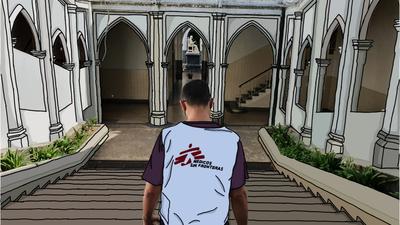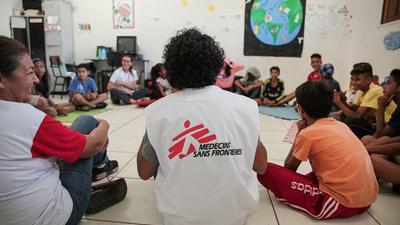The mental health state of Iraqi people, already troubled by year of war, has been worsened by the recent impact of COVID-19 and the country’s current economic situation, says international medical organisation Médecins Sans Frontières/Doctors Without Borders (MSF) on the occasion of World Mental Health Day.
Most MSF projects in Iraq include an element of mental healthcare. MSF spoke to staff and patients in Mosul and Hawija, two of the areas most affected by the recent conflict, where our teams noticed that people’s mental health had worsened significantly. They found very high rates of anxiety and depression among patients trying to recover from the effects of war and displacement, aggravated by the current economic situation and the impact of COVID-19.
Interview with Saima Zaii, MSF mental health activity manager in Mosul
“In general, Mosul is a resilient city, as are its people. They have been through an awful lot. After the war of 2016-17, the people of Mosul are trying to cope. Now the pandemic is another trauma for the people of Mosul.
The cause of mental health issues differed before and after COVID-19. Before the pandemic, our patients suffered from psychological trauma as a result of property being destroyed or lost and family members being arrested, detained or forcibly disappeared. These issues caused longterm suffering, including depression, domestic violence, epilepsy and psychosomatic pains.
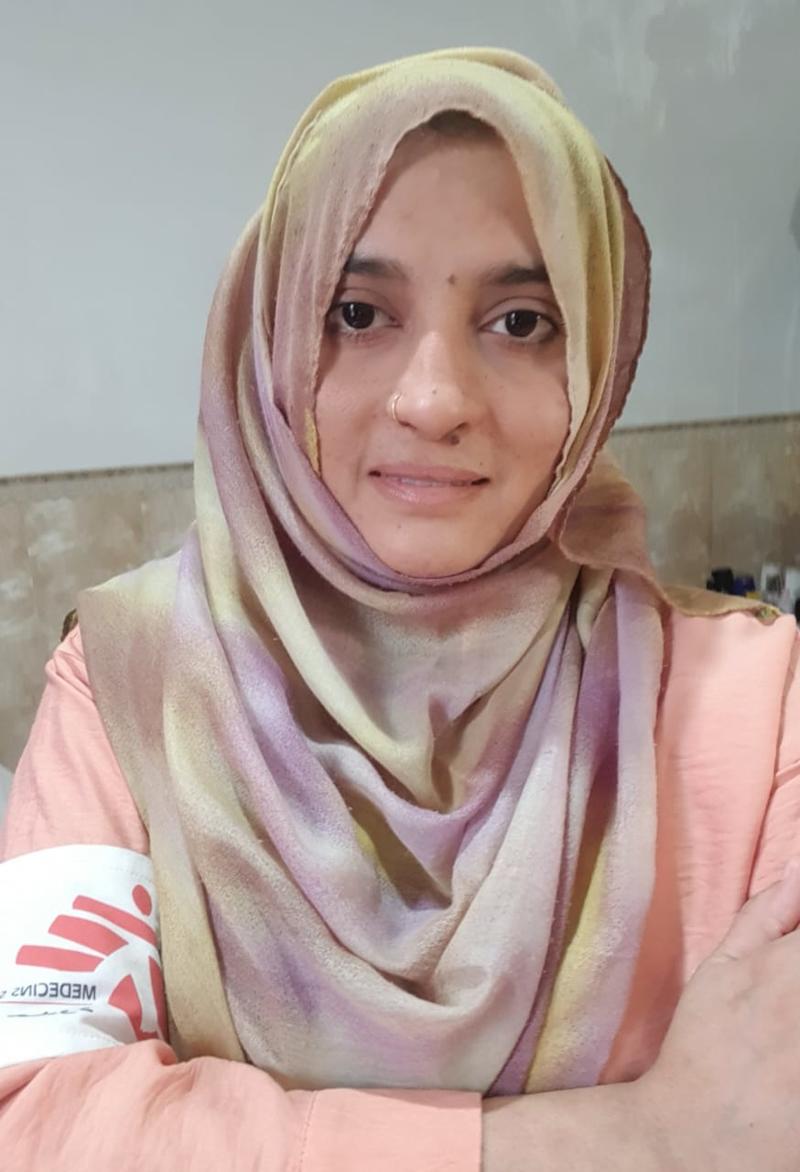
Currently, the most common mental health conditions amongst our patients are anxiety and depression. This year, anxiety levels among our patients rose from 45% to 68%, and depression from 10% to 20%. This is a bad sign because these mental health conditions often develop into more urgent psychological suffering.
Patients’ symptoms include sad moods, irritability, anger, sleep disturbance, loss of interest, fear and feeling threatened. Anxiety can also lead to eating and sleeping disorders, most commonly among females, and more psychosomatic complaints. Children suffer from hyperactivity and hypoactivity, which increased from 6% to 10%.
Our patients were trying to cope with difficult post-war conditions, and then COVID-19 came along and caused them to lose hope in the future. Several patients said that things will be better when the ‘end day’ comes.
Economic hardships, curfews and confinement, loss of income and other severe medical conditions have all led to this high level of anxiety, stress, fear, phobia, hopelessness and lack of interest. Of our patients, 1.65% have suicidal thoughts because of feeling unable to support their families. Most were daily workers who used to earn money for food day by day.
Patients who have contracted COVID-19 suffer mentally as well. They have feelings of guilt and worthlessness and often they worry more about their families than themselves.
People’s mental health needs in Mosul are greater than the services available. But there is little awareness among communities of the importance of seeking mental health support. Many patients delay seeking support because of the stigma.
MSF teams provide psychological support in two clinics and refer patients who need psychiatric support to another organisation. Currently we have 242 patients, and see around 200 patients every month, including new and existing patients. Since September 2019, our teams have provided 31,034 consultations. They have also run 1,335 group psychoeducation sessions and 178 individual psychoeducation sessions about common mental health problems, to reduce stigma and identify people who might need mental health support, so as to refer them to MSF counsellors and psychologists.
We are also providing mental health support to COVID-19 patients inside our COVID-19 treatment centre in Mosul. Most of these patients suffer from anxiety and feelings of guilt and denial. So far, our teams have provided 354 counselling sessions for COVID-19 patients.”
Interview with Sana Sadiq, MSF mental health activity manager in Hawija
“In Hawija, MSF provides mental health support, including both psychological and psychiatric care, to displaced people, the host community and people who have returned to their homes in the area. The number of people with mental health issues is significant compared to other places where we work, such as Abbasi and Laylan. In Hawija clinic we conduct an average of 94 mental health sessions and 518 psychological first aid and psychological therapy sessions every month.
Among our patients, depression is the most common symptom, affecting around 70 percent of patients, followed by anxiety, post-traumatic stress disorder (PTSD) and other disorders.
Factors that are contributing in the increase in mental health issues are financial constraints, losing one’s job, family issues, physical and psychological trauma, injuries caused by bombing and domestic issues. There is no gender differentiation in term of mental health problems; female and male equally face psychological issues. Among children, bed-wetting is common.
The emergence of the COVID-19 pandemic has increased the number of patients who are suffering from uncertainty and who feel all the time the threat of contracting the virus.
For patients with obsessive compulsive disorder (OCD), their daily routines are being disturbed and they become unable to perform daily chores. Patients with these health issues face distorted thought patterns and problems making decisions. Sometimes they suffer from a lack of family and social support that can make them feel worse.
Mental health issues can be managed and treated once the community has awareness about them. When people with challenging mental health conditions are unable to access treatment, this fuels the problem and affects their mental approach towards being a contributing member of society. To help people access the treatment they need, it is important to run awareness raising campaigns alongside mental health services.”

Stories of patients from MSF mental health clinics[1]
Nour: “After losing my husband, I lost faith in the world and locked myself in a dark room”
“I lost my husband in the battle for Mosul. I saw him die and then they brought me his body. I went through a very difficult time after losing my husband – I lost faith in the whole world. I stopped talking to anyone, even my family at home. I gave up on life and locked myself in a dark room. I was like that for years. And then when COVID-19 appeared, I got extremely anxious about getting infected. There is a lot of stigma around the disease. I had long sleepless nights worrying about it.
My family advised me to seek mental health support a couple of months ago. At first I was very reluctant – I couldn’t believe that talking to someone would make me feel better. But then I gave it a try. Counselling made me improve so much. I have started talking again to other people and I feel better about myself. Now I go out, wear nice clothes and look forward to my counselling sessions. I come here because I want to get my life back.”

Fryal: “My family used to be wealthy. Now they are all depressed”
“My family in Hawija used to be wealthy – we had a big house and a nice modern car. My husband had a shop and he had money. When the war started, our house was bombed and we fled. We reached the displaced persons camp almost dead from exhaustion. Life in the camp was very hard. We stayed there for two years. It was always blowing a gale and it was a struggle to get water and to access toilets. Once the authorities allowed people to return home, we went back to our house, only to find everything had been looted.
Just as we were starting to recover from the war, we were hit by another disaster: coronavirus. They shut down everything. My husband would weep and wonder how we were going to feed our children. After several weeks he went back to work, but things never got back to normal.
The war, being displaced from our home and living in the camp really affected my children. I would say that all my children are mentally troubled now – they are all depressed. My daughters wake up at night and cry. My elder daughter is nervous all the time. She feels jealous when I give any attention to my other daughter. My younger daughter is still unable to mix with other people, even our relatives. My sons missed out on education in their childhood and can’t earn a living so they are sad as well. I feel they aren’t capable of moving forward. The whole household is depressed.”
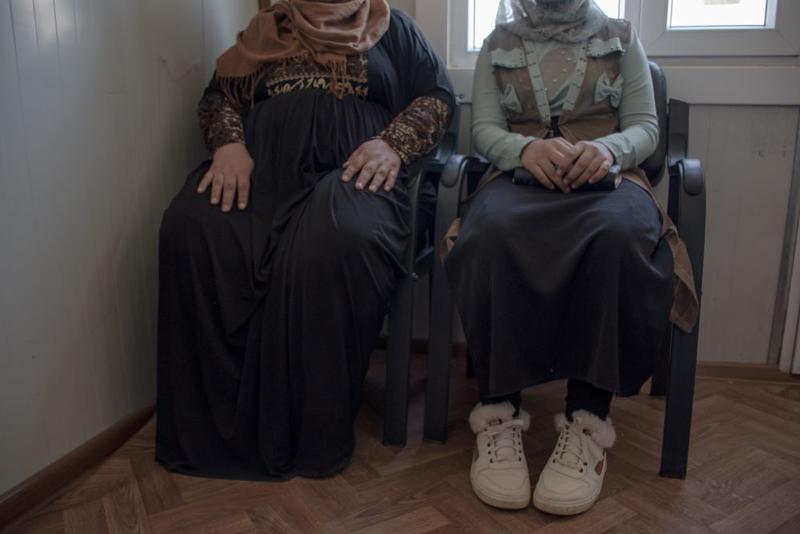
Marwa: “I want to protect my family from COVID-19 – I’m not a selfish person”
“I got married when I was 15 years old. Seven years ago I lost my husband. He was hit by a bullet while sitting in the garden of our home in Mosul and he died. He left me alone with seven children: four girls and three boys. The oldest is 14, the youngest is seven. Ever since then, I’ve been living with my parents-in-law.
Ten days ago I started to feel unwell: I felt tired and my whole body hurt. I also had a fever and cough. I was scared I’d caught coronavirus. I decided to go to the hospital to protect my children, but my relatives were against it. I was referred to MSF’s hospital. I was really worried and upset because my relatives blamed me for leaving my family and my children. They thought I had chosen to be admitted here just to avoid my children and my household responsibilities. But the fact is that I want to protect my children and my parents-in-law from my illness – I’m not a selfish person.
It was difficult for me, as a single parent, to leave my children alone and face the negative attitude of my relatives, but the positive encouragement of MSF staff has really helped me to be a role model for single parents and stay here until the end of my treatment.”
Salma: “As a widow, your family sees you as a burden”
“I’m from Hawija. When the military operation began to retake the area from the Islamic State group, we were displaced from Hawija to Kirkuk. My husband was working as a daily construction worker. He died in an accident at work. I became a widow with two children.
Being a widow immediately puts a strain on your life. All decisions are taken by your family. On top of that, you family starts to resent you, because in their eyes, you’re a burden. I had so much hope in my father. Now he hates me and my children. And it’s crushing me inside.
My father kicked me out of the house and I’m living with my brother now. He‘s not doing very well himself. He too works as a daily construction worker. Jobs are hard to come by. He also has a wife and children to provide for. It’s killing me that I have become a burden on him.
My kids don’t go to school as I can’t cover the costs. A lot of nights I can’t sleep. I pity myself and my situation. I’m never in a good mood. I get angry with everyone – my mum and my kids. After we fight, I regret the things I said and did, but I just can’t control it.
I don’t believe in hope. How could I? Nothing is working out for me. I have no husband, no home, no family support. How should I have hope for the future?”
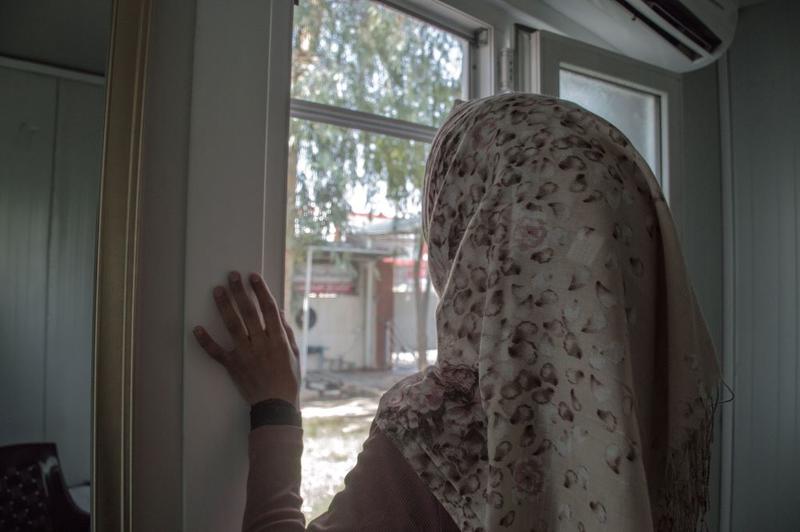
Salah: “I don’t want to know what’s going on in the news”
“I’m so tired of the whole situation. I don’t want to know what’s going on in the news. I don’t even use the internet because I don’t want to hear about what’s happening in the country. It’s all just conflicts and war. People have lost their homes, farms, income, loved ones. A lot of people are struggling in this economic situation right now. They can’t provide what their family needs. This has all built up and now it’s telling on them. It’s got to the point where you can’t even have a decent conversation with someone without getting upset with each other. A father can’t have a conversation with his son. Family relations have broken down. I can’t stress this enough: mentally, people here in Hawija are destroyed. People here need help.”
Hareer: “People were very critical of my going out to work, but I decided not to listen”
“My husband died in the conflict. We lived in a neighbourhood of Mosul where the fighting was very heavy. My son got injured, my sister-in-law and nephew died, three of our neighbours were killed. It was an unforgettably tough day when I lost them all. I felt that my life was over. I was in shock for two years. Now I have to provide for my children.
I was in dire need of a job. I have no education and my uncle, who used to give me money, couldn’t do that anymore. I was thinking too much and stressing all the time about the future. I found a job opportunity, in a facility that treated COVID-19. My stress was high then and I was very hesitant about accepting it. People around me were also very critical of my going out to work and I worried a lot about what people would say. In the end I decided to take the risk and not listen to them. While I had the job I was very unsettled: I was anxious and obsessed all the time that I’d get infected and spread the disease to my children or my elderly father. I was so troubled that I was referred to MSF’s mental health support.
I’ve had four sessions over the past 40 days. It has really helped me regain my self-confidence. Now my children feel that they have a mother they can depend on. I’m planning to get some education but a bit later on. Now I have to enrol my children at school. My work contract ended 10 days ago and I’m looking for another job. I don’t care what people in my community say: that as a woman I shouldn’t go out to work. I will put their words under my feet to become higher, not carry them over my shoulder so they break my back.”

[1] Names of patients have been changed at their request



